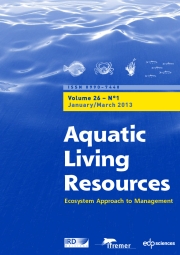Crossref Citations
This article has been cited by the following publications. This list is generated based on data provided by
Crossref.
Cornejo, Rodolfo
and
Koppelmann, Rolf
2006.
Distribution patterns of mesopelagic fishes with special reference to Vinciguerria lucetia Garman 1899 (Phosichthyidae: Pisces) in the Humboldt Current Region off Peru.
Marine Biology,
Vol. 149,
Issue. 6,
p.
1519.
Ehrhardt, Nelson M.
and
Deleveaux, Vallierre K.W.
2007.
The Bahamas’ Nassau grouper (Epinephelus striatus) fishery – two assessment methods applied to a data – deficient coastal population.
Fisheries Research,
Vol. 87,
Issue. 1,
p.
17.
Dawson, Michael N
and
Hamner, William M
2008.
A biophysical perspective on dispersal and the geography of evolution in marine and terrestrial systems.
Journal of The Royal Society Interface,
Vol. 5,
Issue. 19,
p.
135.
Tao, JiangPing
Qiao, Ye
Tan, XiChang
and
Chang, JianBo
2009.
Species identification of Chinese sturgeon using acoustic descriptors and ascertaining their spatial distribution in the spawning ground of Gezhouba Dam.
Chinese Science Bulletin,
Vol. 54,
Issue. 21,
p.
3972.
Kloser, Rudy J.
Ryan, Tim E.
Young, Jock W.
and
Lewis, Mark E.
2009.
Acoustic observations of micronekton fish on the scale of an ocean basin: potential and challenges.
ICES Journal of Marine Science,
Vol. 66,
Issue. 6,
p.
998.
Fablet, Ronan
Lefort, Riwal
Karoui, Imen
Berger, Laurent
Massé, Jacques
Scalabrin, Carla
and
Boucher, Jean-Marc
2009.
Classifying fish schools and estimating their species proportions in fishery-acoustic surveys.
ICES Journal of Marine Science,
Vol. 66,
Issue. 6,
p.
1136.
Koslow, J. Anthony
2009.
The role of acoustics in ecosystem-based fishery management.
ICES Journal of Marine Science,
Vol. 66,
Issue. 6,
p.
966.
Jarvis, Toby
Kelly, Natalie
Kawaguchi, So
van Wijk, Esmee
and
Nicol, Stephen
2010.
Acoustic characterisation of the broad-scale distribution and abundance of Antarctic krill (Euphausia superba) off East Antarctica (30-80°E) in January-March 2006.
Deep Sea Research Part II: Topical Studies in Oceanography,
Vol. 57,
Issue. 9-10,
p.
916.
Ballón, Michael
Bertrand, Arnaud
Lebourges-Dhaussy, Anne
Gutiérrez, Mariano
Ayón, Patricia
Grados, Daniel
and
Gerlotto, François
2011.
Is there enough zooplankton to feed forage fish populations off Peru? An acoustic (positive) answer.
Progress in Oceanography,
Vol. 91,
Issue. 4,
p.
360.
Lezama-Ochoa, A
Ballón, M
Woillez, M
Grados, D
Irigoien, X
and
Bertrand, A
2011.
Spatial patterns and scale-dependent relationships between macrozooplankton and fish in the Bay of Biscay: an acoustic study.
Marine Ecology Progress Series,
Vol. 439,
Issue. ,
p.
151.
Trenkel, VM
Ressler, PH
Jech, M
Giannoulaki, M
and
Taylor, C
2011.
Underwater acoustics for ecosystem-based management: state of the science and proposals for ecosystem indicators.
Marine Ecology Progress Series,
Vol. 442,
Issue. ,
p.
285.
Flynn, A.J.
and
Kloser, R.J.
2012.
Cross-basin heterogeneity in lanternfish (family Myctophidae) assemblages and isotopic niches (δ13C and δ15N) in the southern Tasman Sea abyssal basin.
Deep Sea Research Part I: Oceanographic Research Papers,
Vol. 69,
Issue. ,
p.
113.
Bertrand, Arnaud
Grados, Daniel
Habasque, Jeremie
Fablet, Ronan
Ballon, Michael
Castillo, Ramiro
Gutierrez, Mariano
Chaigneau, Alexis
Josse, Erwan
Roudaut, Gildas
Lebourges-Dhaussy, Anne
and
Brehmer, Patrice
2013.
Routine acoustic data as new tools for a 3D vision of the abiotic and biotic components of marine ecosystem and their interactions.
p.
1.
Béhagle, Nolwenn
du Buisson, Louis
Josse, Erwan
Lebourges-Dhaussy, Anne
Roudaut, Gildas
and
Ménard, Frédéric
2014.
Mesoscale features and micronekton in the Mozambique Channel: An acoustic approach.
Deep Sea Research Part II: Topical Studies in Oceanography,
Vol. 100,
Issue. ,
p.
164.
Bell, Johann D.
Allain, Valerie
Allison, Edward H.
Andréfouët, Serge
Andrew, Neil L.
Batty, Michael J.
Blanc, Michel
Dambacher, Jeffrey M.
Hampton, John
Hanich, Quentin
Harley, Shelton
Lorrain, Anne
McCoy, Michael
McTurk, Nicholas
Nicol, Simon
Pilling, Graham
Point, David
Sharp, Michael K.
Vivili, Paula
and
Williams, Peter
2015.
Diversifying the use of tuna to improve food security and public health in Pacific Island countries and territories.
Marine Policy,
Vol. 51,
Issue. ,
p.
584.
Horodysky, Andrij Z.
Cooke, Steven J.
Graves, John E.
and
Brill, Richard W.
2016.
Fisheries conservation on the high seas: linking conservation physiology and fisheries ecology for the management of large pelagic fishes.
Conservation Physiology,
Vol. 4,
Issue. 1,
p.
cov059.
Letessier, Tom B.
Bouchet, Phil J.
and
Meeuwig, Jessica J.
2017.
Sampling mobile oceanic fishes and sharks: implications for fisheries and conservation planning.
Biological Reviews,
Vol. 92,
Issue. 2,
p.
627.
Scutt Phillips, Joe
Sen Gupta, Alex
Senina, Inna
van Sebille, Erik
Lange, Michael
Lehodey, Patrick
Hampton, John
and
Nicol, Simon
2018.
An individual-based model of skipjack tuna (Katsuwonus pelamis) movement in the tropical Pacific ocean.
Progress in Oceanography,
Vol. 164,
Issue. ,
p.
63.
Escobar-Flores, PC
O’Driscoll, RL
and
Montgomery, JC
2018.
Predicting distribution and relative abundance of mid-trophic level organisms using oceanographic parameters and acoustic backscatter.
Marine Ecology Progress Series,
Vol. 592,
Issue. ,
p.
37.
Dunlop, Katherine M.
Jarvis, Toby
Benoit-Bird, Kelly J.
Waluk, Chad M.
Caress, David W.
Thomas, Hans
and
Smith, Kenneth L.
2018.
Detection and characterisation of deep-sea benthopelagic animals from an autonomous underwater vehicle with a multibeam echosounder: A proof of concept and description of data-processing methods.
Deep Sea Research Part I: Oceanographic Research Papers,
Vol. 134,
Issue. ,
p.
64.

